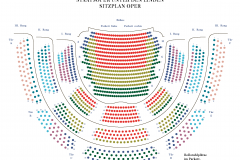Don Carlo
June 2026 | ||||||
|---|---|---|---|---|---|---|
Mo | Tu | We | Th | Fr | Sa | Su |
Don Carlo
Opera in four acts (1867/1884)
Music by Giuseppe Verdi
Text by François Joseph Méry and Camille du Locle after Friedrich von Schiller
Duration: Approximately 3 hours and 30 minutes, including one intermission after Act II
Language: Performed in Italian with German and English surtitles
Recommended Age: Suitable for ages 15 and up
He commands a world empire and yet he is deeply unsettled. Philip II of Spain not only fears losing command but also feels betrayed and deserted by his wife Elizabeth von Valois: she and his son Carlo are in love. Over all this hangs the threatening shadow of the Inquisition. In vain, King Philip seeks trust in a hostile world.
Verdi adapted several dramas by Schiller and wrote lively operas based on their stories. With Don Carlo, he achieved this in a particularly impressive way, first composing a French grand opera version, then an Italian melodrama. Striking tableaux with large-scale scenes for the chorus and ensemble are juxtaposed with chamber music passages, often in the form of psychologically sensitive duets. Here, the characters mutually probe and size each other up, as well as revealing their innermost feelings. Intrigue is spun, people lie and deceive one another – but sometimes light, too, breaks through the darkness, for instance when friendship and love are sworn with compelling power and honesty. Verdi’s epic universal and family drama is an opera of grand state acts as well as emotions, with dramatic intensity and inspired music.
Plot
Act one
Don Carlo is recalling happier days in France, where he had met and fallen in love with the French princess Elizabeth, who was to become his wife. For political reasons, however, Elizabeth of Valois was given in marriage to Carlo’s father, the Spanish king Philip II, instead. A monk resembling Carlo’s grandfather, Carlo V, promises him that he will find consolation in the hereafter. The Marquis of Posa, Carlo’s childhood friend, urges him to come to the aid of the oppressed Netherlands, but Carlo, consumed by his unhappy love affair, is uninterested. He confesses to his friend that he is in love with his own stepmother, shocking Posa, who tells Carlo that his unrequited love is precisely the reason why he should leave the court and lead the Flemish army. The two of them vow to fight together for freedom. Princess Eboli sings a ballad about a veiled woman being courted by the Moorish king. Posa calls on Elizabeth and gives her a letter allegedly written by her mother. At the same time, he slips her a letter from Carlo. Eboli misinterprets Posa’s remarks and thinks that Carlo is in love with her. When they see each other again, Elizabeth promises Carlo that she will support his political plans. Unable to restrain himself, Carlo abandons himself to his feelings. Philip sees his wife unattended and sends the Countess of Aremberg back to France for having neglected her duty to watch over the princess. He makes light of Elizabeth’s unhappiness about this. Philip takes the Marquis of Posa aside. Posa has come to his attention because he alone has not attempted to ingratiate himself with the king. Posa takes the risk of speaking openly and asks for peace and freedom for Flanders. Although the king rejects the request as romantic enthusiasm, he is moved by Posa’s sincerity. Philip promises Posa that he will not call him to account, but tells him to beware of the Grand Inquisitor. He takes him into his confidence, instructing him to spy on Elizabeth and Carlo, whom he suspects of being secretly in love.
Act two
Carlo receives an anonymous invitation to a rendezvous. He realizes too late that it is not Elizabeth, but Princess Eboli, who has appeared to meet him and who now knows that he is in love with the queen and not with her. Posa intervenes and attempts to play down the situation as a misunderstanding. Eboli, however, cannot be placated, making her dangerous to Carlo. Posa advises Carlo to give him all of the papers referring to his involvement in the plans to free Flanders. Carlo hesitates because he has since learned about the friendship between Posa and his father. In the end, however, his trust is restored, and they pledge their loyalty to one another. During the ceremonial opening of an auto-da-fé, Carlo arrives with six deputies from Flanders to petition for peace and freedom for the province. When Philip denies his son’s request that Flanders be made his responsibility, Carlo threatens his father. Posa is the only one who comes to the king’s aid, and the king rewards him with a ducal title. Carlo is arrested and the burning of the heretics begins.
Act three
Philip is tormented by the thought that Elizabeth has never loved him. Unsure as to what he should do about Carlo, he consults the Grand Inquisitor, who promises him absolution for the murder of his son. At the same time, however, he demands that Posa be handed over to the Inquisition. Philip attempts in vain to resist. Elizabeth tells Philip that her jewelry casket has been stolen. Philip, who has the casket, accuses her of adultery when he finds a picture of Carlo in it. Eboli and Posa join them. Eboli recognizes her mistake, and Posa realizes that he must act. When Elizabeth is left alone with Princess Eboli, the princess confesses to having stolen the casket out of jealousy. But there is more: she reveals that she is the king’s mistress. Elizabeth gives her a choice between exile and the convent. Eboli regrets her actions. Posa visits Carlo in prison. When he reports that the dangerous papers have been found in his possession and that he will soon be arrested, Carlo realizes that his friend’s intentions were good. Both pledge loyalty to their political ideal: the liberation of Flanders. A shot rings out, and Posa is mortally wounded. Dying, he tells Carlo that Elizabeth is waiting for him. Philip wants to forgive his son, but Carlo rejects his attempt. Philip acknowledges his responsibility for Posa’s death. The people, incited by Eboli, want to free Carlo. The uproar subsides when the Grand Inquisitor appears and orders the people to kneel before God and their king.
Act four
Carlo comes to Elizabeth while she is praying for inner peace. Both realize that they have lost their chance at love. Carlo wants to go to Flanders, and Elizabeth urges him to follow his plan. She bids him farewell. Philip appears, accompanied by the Grand Inquisitor. While Philip is calling Elizabeth to account, he gives his son into the hands of the Grand Inquisitor.
Program and cast
Musical Director: Leonardo Sini
Director: Philipp Himmelmann
Set Design: Johannes Leiacker
Costumes: Klaus Bruns
Light: Davy Cunningham
Chorus Master: Gerhard Polifka
Philipp II., King of Spain: René Pape
Don Carlo, Infante of Spain: Fabio Sartori
Rodrigo, Marquis of Posa: Alfredo Daza
The Grand Inquisitor: Taras Shtonda
A monk: Friedrich Hamel
Elisabeth of Valois: Ewa Płonka
Princess Eboli: Marina Prudenskaya
Tebaldo: Serafina Starke
A Voice from Heaven: Sonja Herranen
Count Lerma, A Herald: Junho Hwang
Staatsopernchor, Staatskapelle Berlin
State Opera Unter den Linden
Staatsoper Unter den Linden is one of Berlin's most prestigious opera houses, with a rich history and significant cultural impact.
History:
The Staatsoper Unter den Linden was originally built between 1741 and 1743, under the direction of architect Georg Wenzeslaus von Knobelsdorff. It was commissioned by Frederick II of Prussia and was initially named the Königliche Oper (Royal Opera). The opera house has undergone several renovations and reconstructions, notably after World War II damage. It reopened in 1984, following a major renovation.
Construction:
The original design was characterized by its Baroque style, featuring an elegant façade and a grand entrance. The building was reconstructed in the 1950s and 1980s, maintaining its classical exterior while modernizing the interior. The façade features a classic portico with six Corinthian columns and a prominent central pediment.
Interior:
The interior is known for its opulent and classical design. The auditorium is renowned for its acoustics and grandeur, with luxurious velvet seats and elaborate decorations. The stage and seating areas have been updated to meet modern performance standards while preserving historical aesthetics.
Concerts and Performances:
The Staatsoper Unter den Linden hosts a variety of performances, including operas, orchestral concerts, and ballet. It is home to the Staatskapelle Berlin, one of Germany's leading orchestras. The opera house is celebrated for its high-quality productions and its role in Berlin’s vibrant cultural scene.
JOURNEY
The Staatsoper Unter den Linden has completely barrier-free access due to its excellent public transport connections.
ADDRESS: Unter den Linden 7; 10117 Berlin
SUBURBAN RAILWAY
S+U Friedrichstraße (S1, S2, S5, S7, S25, S75)
SUBWAY
Hausvogteiplatz (U2)
Museumsinsel (U5)
Stadtmitte (U2, U6)
Unter den Linden (U5, U6)
BUS
Staatsoper (100, 245, 300)
Unter den Linden/Friedrichstraße (100, 147, 245, 300, N6)
PARKING
Q-PARK parking garage Unter den Linden/Staatsoper
Bebelplatz, 10117 Berlin
There are five electric charging stations in the parking garage. Further information can be found here.
The underground car park on Bebelplatz offers disabled parking spaces and direct access to the opera house. On entering the car park between 5.30pm and 11.30pm, the maximum parking fee is €7. To use this tariff, enter your parking ticket in one of the pay machines and the message »Theatertarif« will appear on the display. Please note that it is not possible to use the tariff if you enter the car park before 5.30pm. so it will not be shown on the display. TIP: If you pay the theatre tariff at the pay machine before the event, you can avoid unnecessary waiting after the show.

 EN
EN DE
DE IT
IT FR
FR ES
ES RU
RU JP
JP RO
RO
 Seating plan
Seating plan 